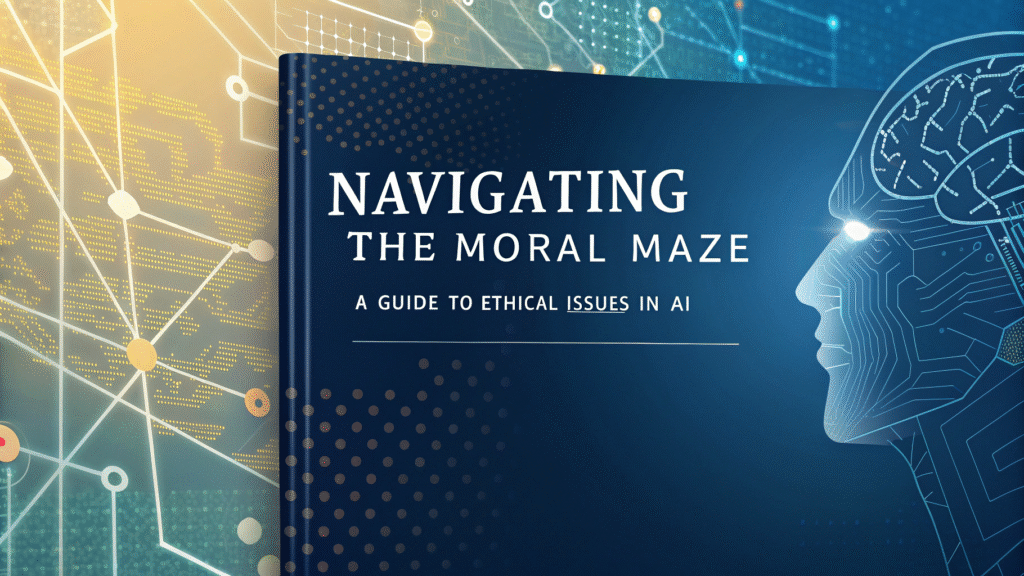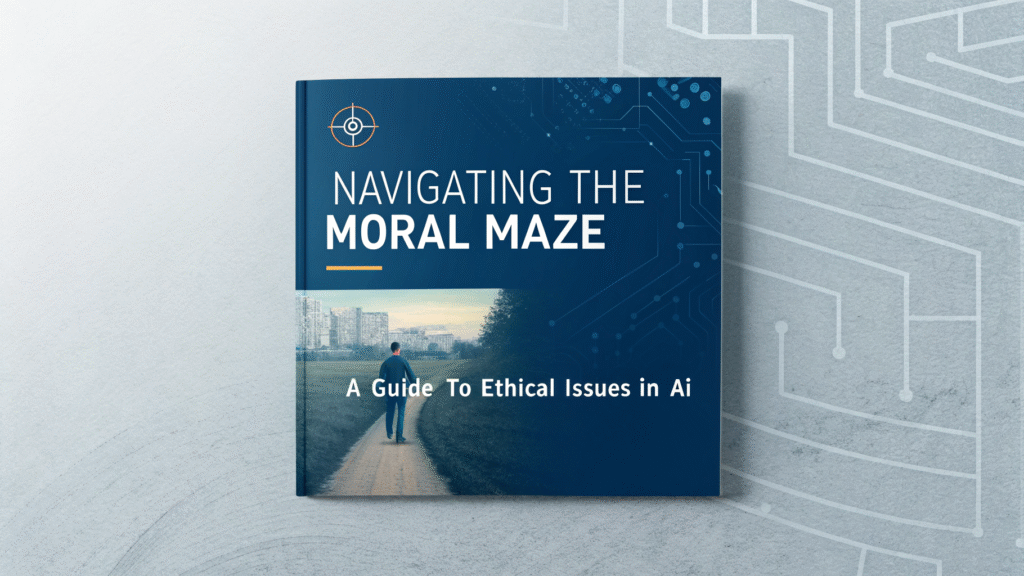
Introduction
Artificial Intelligence is no longer a futuristic concept; it’s a core part of our daily business tools and strategies. However, this rapid integration forces us to ask a crucial question: Are we developing and using AI responsibly? The conversation around ethical issues in AI has moved from academic circles to boardrooms, becoming a central concern for anyone leveraging this powerful technology.
For entrepreneurs, marketers, and content creators, ignoring these ethical dilemmas isn’t just a moral misstep—it’s a business risk. From biased algorithms that alienate customers to data privacy scandals that destroy brand trust, the stakes are incredibly high. This guide will walk you through the landscape of AI ethics, providing a clear understanding of the challenges and actionable strategies for navigating them successfully.
History & Evolution
The journey of AI ethics has existed since the dawn of AI, but its urgency has skyrocketed in recent years.
- The Foundational Years (1950s-1990s): Early discussions were largely philosophical, pondering questions from science fiction about machine consciousness and autonomy. Isaac Asimov’s “Three Laws of Robotics” exemplifies these early ethical thought experiments.
- The Dawn of Data-Driven Concerns (2000s-2010s): As machine learning took off, fueled by big data, the ethical issues became more tangible. Problems like algorithmic bias in hiring software and predictive policing tools showed how AI could perpetuate and amplify human prejudices on a massive scale.
- The Modern Era of Accountability (2020-Present): With the advent of generative AI (like ChatGPT and DALL-E), ethical concerns have become mainstream. Issues of copyright infringement, mass misinformation, job displacement, and data scraping without consent are now front-page news, prompting calls for regulation and corporate accountability.
Audience & Demographics
IIdentifying who feels the impact of ethical issues in AI helps us tailor both the discussion and the solutions.
- Entrepreneurs & Business Leaders: They are responsible for the strategic implementation of AI and bear the ultimate risk for ethical failures that can lead to legal trouble and reputational damage.
- Marketers & Advertisers: This group uses AI for targeting, personalization, and content creation. They must grapple with the ethics of data collection, consumer manipulation, and the authenticity of AI-generated campaigns.
- Content Creators: They grapple with ethical dilemmas—using AI as a creative aid or replacement, and protecting their work from unauthorized use in AI training.
- The General Public: As end-users, they are the ultimate subjects of AI systems, affected by biased decisions, privacy invasions, and the spread of deepfakes.
Key Features & Functions (Where Ethics Apply)
To understand the ethics, we must look at where they break down in AI’s core functions.
- Algorithmic Decision-Making: AI systems that support decisions—like loan approvals or resume screening—can inherit bias when trained on flawed data.
- Data Harvesting & Analysis: AI’s hunger for data raises major privacy concerns. How do organizations collect data? Do they obtain informed consent? How do they store and use that data?
- Content Generation & Automation: Generative AI tools create text, images, and video, leading to questions about authenticity, copyright, plagiarism, and misinformation.
- Predictive Analytics: While excellent for forecasting trends, these systems can unfairly profile individuals based on historical data patterns.
Business & Marketing Potential
Addressing ethical issues in AI isn’t just about avoiding risk—it’s a significant business opportunity.
- Builds Trust and Brand Loyalty: Consumers trust companies that stay transparent about AI use and actively address ethical concerns.
- Creates a Competitive Advantage: An “Ethical by Design” approach can be a powerful differentiator in a crowded market.
- Enhances Product Quality: Ethical audits often reveal biases that, when fixed, lead to AI systems that work better for a broader, more diverse user base.
- Attracts Top Talent: The best employees want to work for companies that align with their values, and a strong ethical stance on technology is increasingly important.
Best Practices & Tips
Here’s how your business can proactively manage ethical issues in AI.
- Establish an AI Ethics Framework: Define clear principles—such as fairness, accountability, and transparency—to guide your AI development and use.
- Prioritize Diverse Data and Teams: Combat bias by using diverse datasets and engaging multidisciplinary teams—including ethicists and social scientists—in AI projects.
- Implement Human-in-the-Loop (HITL): Have humans review all critical decisions, letting AI support rather than replace their judgment.
- Practice Radical Transparency: Clearly inform users when they interact with AI. Show them how their data is used and explain how algorithms make decisions that impact their experience.
- Conduct Regular Audits: Continuously test your AI systems for bias, accuracy, and unintended consequences.
Challenges & Limitations
Despite best intentions, several hurdles make addressing ethical issues in AI difficult.
- The “Black Box” Problem: Many complex AI models are opaque, making it hard to understand why they made a particular decision, which challenges accountability.
- Regulatory Lag: Technology evolves much faster than laws and regulations, creating a gray area where unethical practices can flourish temporarily.
- The Bias Problem is Deep-Rooted: AI learns from human-generated data, inevitably inheriting societal biases that remain extremely difficult to eliminate.
- The Trade-Off Between Innovation and Caution: Moving quickly to stay competitive can sometimes conflict with the slow, deliberate work required for ethical implementation.
Future Outlook
The field of AI ethics is dynamic and will continue to evolve.
- Increased Regulation: Laws like the EU’s AI Act are just the beginning. Businesses should prepare for a more regulated environment with stricter compliance requirements.
- Rise of Explainable AI (XAI): Researchers and developers are pushing to create AI systems that humans can easily understand and explain.
- Ethical AI as a Service: We will likely see the growth of third-party tools and services dedicated to auditing AI systems for bias, fairness, and compliance.
- Consumer Demand for Ethics: As awareness grows, consumers will increasingly vote with their wallets, favoring brands that demonstrate a commitment to ethical AI.

Conclusion
Navigating the complex landscape of ethical issues in AI is one of the most critical challenges and opportunities for modern businesses. It requires a proactive, thoughtful approach that integrates ethical considerations into the very fabric of your technology strategy.
The goal is not to avoid AI; rather, it is to embrace it responsibly. In fact, entrepreneurs, marketers, and creators can harness the incredible power of AI while simultaneously prioritizing fairness, transparency, and accountability. Furthermore, by applying these principles, they set a higher standard for innovation that benefits both businesses and society. As a result, this balanced approach does more than simply unlock efficiency; it also helps build a foundation of trust.
Moreover, trust is not just a byproduct of ethical AI use—it is the very cornerstone of long-term success. In addition, when people see that AI is being deployed in ways that respect human values, they are far more likely to engage with it positively. Therefore, leaders who embrace AI wisely do not just gain a competitive edge; they also secure lasting credibility.
Ultimately, the future of AI must be not just smart, but also wise and just. Consequently, our collective challenge is to ensure that technological progress goes hand in hand with human responsibility. However, if this balance is ignored, the promise of AI could quickly turn into a source of distrust. Thus, embracing AI responsibly is not optional—it is the only path to sustainable growth and innovation.